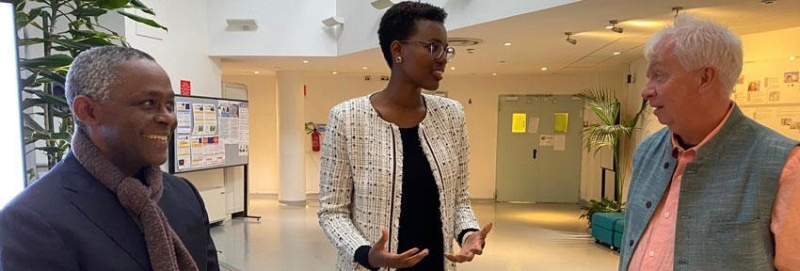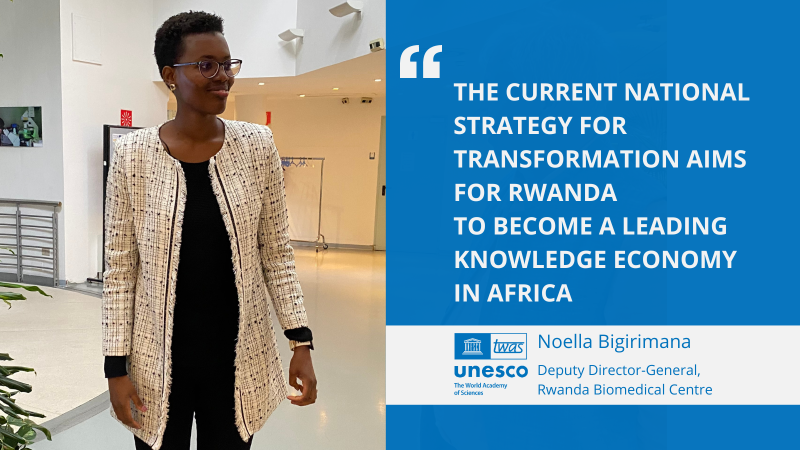
Noella Bigirimana, the Deputy Director-General of the Rwanda Biomedical Centre, visited TWAS and the International Centre for Genetic Engineering and Biotechnology (ICGEB) in Trieste, Italy, on 24 February.
She gave a presentation about high-impact research and development initiatives ongoing in Rwanda, such as an end-to-end manufacturing plant for mRNA vaccines and other medical products. But this was just one part of her mission. She also met with TWAS Executive Director Romain Murenzi and ICGEB Director-General Lawrence Banks to reinforce Rwanda’s important partnership with both organizations.
"I'm here today because there is a long-standing engagement between the Government of Rwanda and these two international centres based in Trieste—ICGEB and TWAS. This is a collaboration that we want to implement further," she said. As she recalled, Paul Kagame, Rwanda's President, and Charles Murigande, a former Minister of Education, visited Trieste in 2014 and 2019 respectively to establish international collaborations.
Rwanda has experienced steady economic growth rates for over a decade, and is currently among the fastest-growing economies in Africa. The country aspires to become a middle-income country by 2035, and a high-income country by 2050. In addition, Rwanda is expecting to soon be a full ICGEB Member State.
Cooperating to advance African research
In her seminar, Bigirimana explained that her centre aims to engage in advanced research activities supported through collaborations with national and international partners.

She highlighted current gaps in access to vaccines and therapeutics in Africa, the second most populated continent in the world, home to about 1.3 billion people. "Africa consumes nearly 25% of the globally produced vaccines. This percentage will increase due to an estimated 2.5% annual population growth," she explained.
Despite this increasing demand, the continent imports an estimated 99% of its vaccines and 95% of its medicines. As she noted: "We need something else, a more sustainable approach in order to increase access to vaccines, therapeutics and diagnostics." Africa needs to build its capacity in research, production and distribution, Bigirimana urged, and Rwanda has ambitions to do so.
Rwanda is positioned to become a biotechnology hub for the region and the continent, she said, and is building collaborations in critical healthcare areas. A pan-African flagship effort is now underway, through a partnership with the German biotechnology company BioNTech that was launched in August 2021. A kick-off ceremony followed in June 2022, when the construction of a vaccine factory officially started.
Rwanda will be the first African country to host an autonomous mRNA manufacturing plant. The initiative is a collaborative effort between Rwanda, Ghana, Senegal, the African Union, the World Health Organization, and the European Union. These nations are joining efforts with BioNTech to build the first local African vaccines hub.
The idea was to take inspiration from a factory like BioNTech's one in Marburg, Germany, bring it to Africa, and reproduce it there with modular containers used as laboratories. The idea became reality this year, and the facility will soon become operational.
The first BioNTainers—modular containers that, when assembled, form a larger mRNA-producing building—from BioNTech arrived in Rwanda on 13 March, three years since Rwanda’s first COVID-19 case was detected.
"This infrastructure will serve single to multi-drug production, accelerating knowledge and technology transfer in the region, and sustaining pandemic preparedness," Bigirimana said. At full capacity, it is expected to produce up to 50 million vaccine doses per year.
Economic growth through science
With every manufacturing phase done locally under strict quality control, the plant will offer employment and attract international collaboration. "The manufacturing plant will produce already-approved vaccines," Bigirimana clarified. The goal is to take the lead and connect with similar initiatives across Africa, to build a critical mass and make the continent attractive for foreign investments.
The Africa Centre for Disease Control has established ambitious goals for the future, including achieving 60% local vaccine production by 2040. But there's more. Developing a strong science and technology foundation is critical. Rwanda, in fact, looks to be part of the Fourth Industrial Revolution (4IR) by training in the latest advanced digital technologies, and becoming an inclusive hub for other African countries.
Precision medicine is another up-and-coming field where Rwanda wants to keep pace, and access to targeted therapies is of great interest. The Internet of Medical Things (IoMT) and other 4IR technologies are also part of the picture.
IoMT, the application of the Internet of Things concept to medicine, allows machine-to-machine communication among medical devices. It includes remote monitoring of patients, tracking medication prescriptions and sending information to the caregivers. It also requires scores of well-trained scientists who know how to collect and understand the enormous amounts of data produced every day.
"Science and technology have been our government's focus in the past decades and the current national strategy for transformation aims for Rwanda to become a leading knowledge economy in Africa," Bigirimana said. "Today, Rwanda aims to serve its people, the region, and the continent."
Cristina Serra

